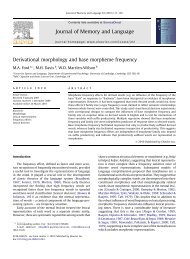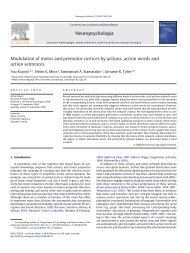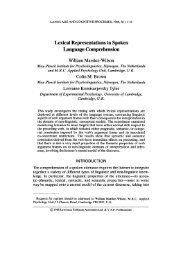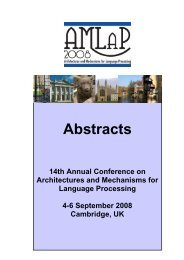Towards a psychological basis for a theory of anaphora - Centre for ...
Towards a psychological basis for a theory of anaphora - Centre for ...
Towards a psychological basis for a theory of anaphora - Centre for ...
You also want an ePaper? Increase the reach of your titles
YUMPU automatically turns print PDFs into web optimized ePapers that Google loves.
it makes it clear that the differences between older and<br />
younger children in this domain do not reflect<br />
qualitative differences in processing strategies. The<br />
five year-olds' poorer per<strong>for</strong>mance in the pronoun<br />
condition si~nply reflects<br />
ability to exploit all <strong>of</strong><br />
a developmental 1aq in the<br />
the weighting in<strong>for</strong>mation<br />
carried by a pronoun.<br />
We note, finally, that the present account also<br />
accomodates a number <strong>of</strong> otherwise puzzling observations<br />
we have made about the on-line interpretability <strong>of</strong><br />
anaphor ic pronouns in natural conversational discourse<br />
(Marslen-Wilson, Levy, & Tyler, in preparation),<br />
Although adult speakers produce a high proportion <strong>of</strong><br />
pronoun anaphors in such a way that they are, in<br />
principle, immediately resolvable (given their lexical<br />
and configurational properties), there are also numerous<br />
exceptions. First, and consistent with our proposals<br />
above, there are pronouns which are lexically and<br />
configurationally ambiguous between more than one<br />
potential antecedent, and where the properties<br />
predicated <strong>of</strong> the pronouns by the rest <strong>of</strong> the utterance<br />
provide inferential disambiguation. Second, and most<br />
significant <strong>for</strong> the present argument, there are some<br />
cases where the<br />
clearly imply a<br />
lexical properties <strong>of</strong> the pronoun<br />
particular antecedent, but where the<br />
subsequent properties predicated <strong>of</strong> the pronoun are<br />
pragmatically incompatible with this antecedent, and<br />
point to a quite different one [10].<br />
If lexical variables were operating in a context <strong>of</strong><br />
all-or-'none selection, then one would expect cases <strong>of</strong><br />
this type to produce "garden-path" effects in the<br />
l istener. But, in in<strong>for</strong>mal observation, we have noticed<br />
no such efEects. In fact, we only detected these cases<br />
in the first place as the result <strong>of</strong> asystematic<br />
analysis <strong>of</strong> the on-line interpretability <strong>of</strong> each pronoun<br />
anaphor in the discourse. S£ one listens to the<br />
discourse normally, then theso "violations" slip by<br />
without causing any apparent perturbations. This is<br />
difficult to explain unless one assumes that the<br />
listener can indeed carry along multiple interpretative<br />
hypotheses, and may delay committment to any single one<br />
<strong>of</strong> these until pragmatic inferencing, relative to the<br />
discourse and the world, confirms one particular<br />
assigment and rules out any others.<br />
If this analysis is correct, then the results <strong>of</strong><br />
the present lexical decision experiment can be taken at<br />
their face value - namely, as reflecting the multiple<br />
detfvation <strong>of</strong> potential antoccdonts, Tho lcxical<br />
constraints carried by the pronoun here did not lead to<br />
an immediate all-or-none choice <strong>of</strong> a single antecedent,<br />
but only to a weighting in favour <strong>of</strong> one <strong>of</strong> the two<br />
antecedents being actively considered. It remains to be<br />
seen in future experiments whether discourse structural






